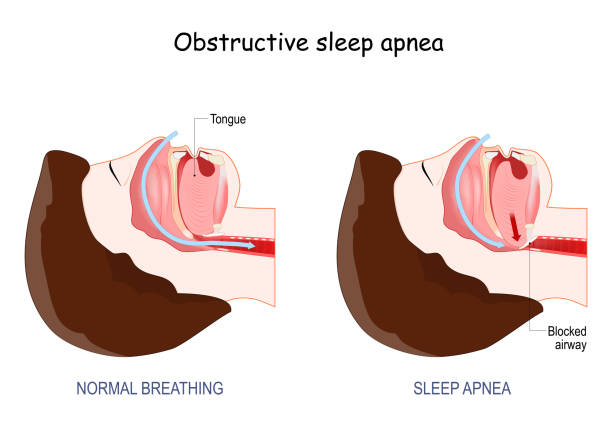Make an Appointment
What Is Obstructive Sleep Apnea?
Obstructive sleep apnea (OSA) disease occurs when anything blocks part or all of your upper airway while you sleep. To widen your airway and draw air into your lungs, you have to exert more effort with your diaphragm and chest muscles. You might even shortstop breathing if your breathing becomes so shallow. A loud gasp, snort, or body jerk typically signals the beginning of your next breath. You might have trouble sleeping, but you will not likely be aware of it.
Additionally, the illness may lessen the amount of oxygen reaching your organs and result in irregular heartbeats.
Obstructive Sleep Apnea Symptoms
Some of the common obstructive sleep apnea symptoms include:
- Daytime sleepiness or fatigue
- After waking up, having a dry mouth or aching throat
- Headaches in the morning
- Trouble concentrating, forgetfulness, depression, or crankiness
- Night sweats
- Restlessness during sleep
- Sexual problems
- Snoring
- Gasping or choking in the sleep
- Trouble getting up in the mornings
- Frequently waking up in the middle of the night to go pee
- High blood pressure
- Gastroesophageal reflux disease (GERD)
If you share a bed, your partner will most likely discover your sleep apnea before you do.
Children’s symptoms might not be as obvious. They could comprise:
- Bed-wetting
- Choking or drooling
- Profound sweating at night
- When they exhale, their ribcage curves inward.
- Learning and behaviour problems
- Problems at school
- Sluggishness or sleepiness (often seen as laziness)
- Snoring
- Teeth grinding
- Restlessness in bed
- Breathing that pauses or stops
- Unusual sleeping positions, such as kneeling down to sleep or bending their neck further back
These symptoms can also be brought on by a wide range of other illnesses. To rule these out, consult your doctor.
Obstructive Sleep Apnea Causes
The most common cause of obstructive sleep apnea is when the muscles that govern your airway relax excessively, narrowing your throat. To reopen your airway, you briefly wake up, but you probably would not recall doing so. Each hour, this might occur dozens of times.
Obesity, big tonsils, and medical conditions including endocrine disorders or heart failure are a few more factors that might block your throat and lead to obstructive sleep apnea.
Obstructive Sleep Apnea Risk Factors
Obstructive sleep apnea (SMA) disease is relatively common. It is more likely if you:
- Are male
- Are older
- Are black, Hispanic, or Native American
- Have a family history of sleep apnea
- Have asthma
- Smoke
- Have diabetes
- Have high blood pressure
- Are more likely to experience heart failure or a stroke
- Are overweight or obese
- Have a large or thick neck
- Have smaller airways in your nose, throat, or mouth
- Have too much tissue hanging down from the back of your throat, obstructing your airway
- Have a large tongue
Obstructive Sleep Apnea Complications
Obstructive sleep apnea complications can include:
- Daytime drowsiness and difficulty focusing. Children may struggle in school, while adults may be more prone to accidents.
- Cardiovascular issues like heart attacks, strokes, high blood pressure, and irregular heartbeats
- Eye problems involving glaucoma and dry eyes
- Metabolic disorders such as type 2 diabetes
- Problems with pregnancy including gestational diabetes or low-birth-weight babies


One Comment
Pingback: Obstructive Sleep Apnea (OSA) Disease – Sujata Birla Hospital